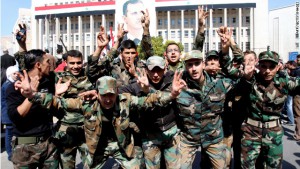Syrian government forces and their allies captured another major eastern Aleppo neighborhood and several smaller areas Monday, putting much of the northern part of the city’s besieged rebel-held areas under government control for the first time in four years, state media reported.
Russia’s Defense Ministry said the areas captured by Syrian government troops include 12 neighborhoods and over 3,000 buildings in the past few days. It added that Syrian government troops are now controlling 40 percent of the rebel-held parts of the Syrian city of Aleppo.
The ministry added in a statement that more than 100 rebels have laid down their arms and exited the Syrian city’s eastern suburbs.
Aleppo, Syria’s largest city and former commercial center, has been contested since the summer of 2012 and a rebel defeat in the city would be a turning point in the five-year conflict. If Syrian forces capture all of east Aleppo, President Bashar Assad’s government will be in control of the country’s four largest cities as well as the coastal region.
The government’s push, backed by thousands of Shiite militia fighters from Lebanon, Iraq, and Iran, and under the cover of the Russian air force, has laid waste to Aleppo’s eastern neighborhoods. Medical and food supplies have been running short in recent weeks as Syrian warplanes pounded the besieged enclave, rendering all remaining functioning hospitals out of service.
Simultaneous advances by Syrian government and Kurdish-led forces on Sunday set off a tide of displacement inside the divided city, with thousands of residents evacuating their premises to safety in government and Kurdish-controlled areas of the city since Saturday.
Rebel defenses swiftly collapsed as government forces pushed into the Hanano district on Saturday, the first time they had pushed this far into eastern Aleppo since 2012.
Ahmad Araj, senior official with the Syrian National Democratic Coalition, an opposition organization of Arab and Kurdish groups, said 8,000 people have fled to the Kurdish-controlled Sheikh Maqsoud district so far. He called on international aid organizations to help those who are now displaced.
Araj, whose group is part of the Kurdish-led and U.S.-backed Syria Democratic Forces, acknowledged there was “something of” an agreement to surrender areas of northeast Aleppo to the SDF’s Kurdish-led forces in exchange for guarantees to protect the civilians that come under their care.
He added that it is likely that the SDF would absorb Arab fighters and moderate factions into its ranks saying: “We will coordinate with (the moderates) so we have a shared front.”
With Monday’s capture of Sakhour, the rebels are now left boxed in mostly in central and southeastern Aleppo, encircled by government troops on all sides.
The Syrian army’s media arm said troops now control 20 square kilometers (nearly 8 square miles) of the total 45 square kilometers (17 square miles) of east Aleppo.
A correspondent for Al-Manar TV of Lebanon’s Hezbollah group reported from inside east Aleppo’s Haidariyeh area, which was captured Monday, showing bulldozers removing barriers to open roads as Syrian troops drove through the streets in armored personnel carriers. Hezbollah fighters are taking part in battles along with Syrian troops.
State TV said 3,000 people, half of them children, have fled over the past few hours. It showed men, women and children in green buses being taken to government-controlled areas.
“It is stinging cold, food is scarce and people are shaken in the streets,” Mohammad Zein Khandaqani, a member of the Medical Council in Aleppo, told The Associated Press in a voice text message from east Aleppo.
He added that some residents are taking refuge in mosques while others moved to homes of displaced people in safer areas.
He said although thousands of people have fled to government or Kurdish-controlled areas in Aleppo, many stayed because they are wanted by the state and fear being caught if they leave.
The Russian Defense Ministry also said Syrian government troops had pushed the rebels from Qadisia which it described as the “key neighborhood of eastern Aleppo.”
Near the capital Damascus, government buses left the Palestinian suburb of Khan al-Shih Monday carrying scores of gunmen with their families to the northwestern province of Idlib, a rebel stronghold, according to Palestinian official Khaled Abdul-Majid. A deal was reached earlier this month in the rebel-held suburb for fighters to leave.
He told The AP in a telephone interview that the evacuation of 1,640 gunmen along with some 300 families would be carried out over three days.
ap.org



